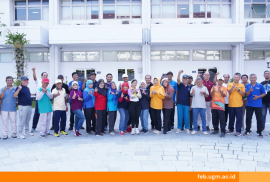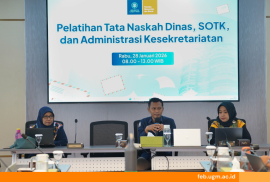Volunteering is among the most popular activities for young people, including college students. Volunteers’ main attractions are opportunities to develop work skills, build relationships, and gain valuable experience. However, in recent years, many young people have only been interested in volunteering for a short period. This has become a challenge for specific events that rely heavily on volunteer human resources.
Rokhima Rostiani, S.E., M.Mgt., a lecturer in the Department of Management at the Faculty of Economics and Business (FEB) UGM, conducted a study entitled The Human Touch: Investigating the Importance of Anthropomorphism in Retaining Volunteers at the Jogja NETPAC Asian Film Festival. The study focused on the declining retention rate of volunteers at one of Yogyakarta’s most iconic events, the 17th Jogja NETPAC Asian Film Festival (JAFF), which will be held in 2022. The findings were presented at the FEB Research Day on December 13, 2024, at the FEB UGM Learning Center.
Rokhima explained that the Jogja NETPAC Asian Film Festival (JAFF) is one of Indonesia’s leading film festivals, emphasizing the development of Asian cinema since its inception in 2006. JAFF has had a significant social impact as an international festival highlighting independent films that address social issues. However, during its 17th edition, JAFF faced several challenges, including a declining volunteer retention rate.
“As an event that relies heavily on the availability of volunteers, JAFF is facing a serious problem with the declining retention of volunteers with the necessary skills,” she explained.
Rokhima noted that this situation occurs because volunteers feel that their one-time contribution is sufficient and do not want to participate in subsequent years (altruistic motives). Currently, volunteers are more interested in the volunteer experience than in fostering a sense of belonging within a community.
This issue led Rokhima to analyze it through anthropomorphism, which refers to attributing human traits, characteristics, or behaviors to non-human entities to create an emotional connection between humans and these entities. Using this concept, she analyzed the relationship between psychological closeness, psychological contact, commitment, and intention to continue volunteering. The research included an online survey of 800 JAFF volunteers.
The results showed that the anthropomorphism used at JAFF was insufficient to meet the volunteers’ autonomy needs. The results also showed that while volunteers felt psychologically close and connected to JAFF, they were not motivated to continue contributing in the future.
“They recognize that they are connected to the event and feel that JAFF has certain expectations of them, but they still do not want to contribute or volunteer again,” Rokhima explained.
She revealed that one factor influencing low volunteer retention is the unclear system and lack of a leader to guide volunteers’ roles and responsibilities. In addition, academic commitments also contributed to the declining retention of volunteers at JAFF.
Reportage: Najwah Ariella Puteri
Editor: Kurnia Ekaptiningrum
Sustainable Development Goals







